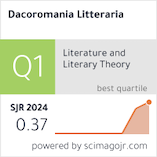BONDING THROUGH IRONY: TEXTUAL COMMUNITIES IN I.L. CARAGIALE AND RADU COSAŞU
(Abstract)
Starting from Jean-Luc Nancy’s explanation of literature as both community-making and interrupter of community myths, this paper discusses Kuisma Korhonen’s notion of “textual community”. Textual community refers to the interaction between reader and text as a form of open, virtual cooperation that avoids the essentialism of political or religious communities. Trying to locate historically and culturally the propositions of the two scholars, this paper reads two distant, yet connected authors in Romanian literature, the 19th century classic Ion Luca Caragiale and the contemporary author Radu Cosaşu in their dealings with communities and their unmaking in their respective texts. Caragiale presents how nationalist rhetoric can be divisive rather than unifying when paired with personal pride and stupidity. Cosașu analyses the moral failure of writers’ solidarity in the face of communist totalitarianism. Both are using irony as the overarching technique to dissolve fraudulent communities and forge on their ruins a new, textual community.
Keywords: textual community, irony, deconstruction, modern Romanian literature, Ion Luca Caragiale, Radu Cosaşu.


